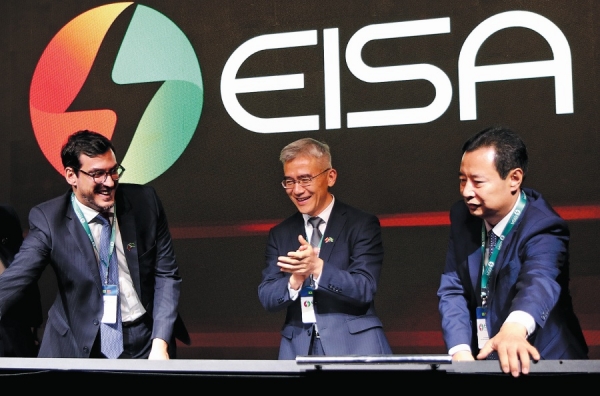
Attendees reveal the logo for the China-Brazil Electric Innovation and Sharing Alliance on Sunday in Rio de Janeiro, Brazil. MAY ZHOU/CHINA DAILY
The China-Brazil Electric Innovation and Sharing Alliance, created as a platform for sharing information and technological innovation for the development of the power sectors in both countries, was officially launched on Sunday on the eve of the 19th G20 Summit.
Led by State Grid Brazil Holding and the Brazilian Ministry of Mines and Energy, the EISA will initially comprise 15 members, including businesses, research institutes, universities and government agencies from both countries.
"The new round of technological revolution in green, low-carbon and intelligent energy is pushing forward energy transformation," said Sun Tao, chairman of State Grid Brazil Holding. "As an active participant in Brazil's power transmission sector, we are committed to building low-carbon, clean, efficient and safe energy equipment for both China and Brazil."
While China has helped Brazil develop its power transmission system, the transformation to green energy requires both countries to work together to meet the new challenges, Sun said.
Sun added that the group will first focus on how to better integrate renewable energy into the grid to meet complex future demand. Members of the alliance hope to share resources to jointly establish international standards for the sector.
Thiago Barral, national secretary of energy transition and planning at Brazil's Ministry of Mines and Energy, said that to reach the level of a developed country, Brazil needs to more than triple its production and use of electricity.
"Meeting this growth in demand while maintaining the highly sustainable and renewable characteristics of our electricity grid is a challenge of our time," Barral said. "We also need to address and ensure that our systems can adapt to extreme weather events and climate change, in addition to ensuring cybersecurity."
He said that advanced technological innovation and the planning of public policies are necessary to meet the challenges.
Barral said that China and Brazil share many of the same challenges. "That is why the Ministry of Mines and Energy reinforced and reiterated its support for the creation and launch of the alliance," he said.
Thiago Prado, president of the Energy Research Office, said that within the framework of the EISA, representatives from his organization and the Ministry of Mines and Energy will visit China, focusing on high-voltage direct current technologies in the near term.
Prado said that to implement Brazil's plans for expansion in the energy sector, a large amount of money will be invested, providing opportunities for organizations such as the EISA to develop required technology.
Jin Wei, deputy general manager of State Grid Corp of China, said the platform will support technological and scientific research to ensure innovations in the power sectors of the two countries.
"China and Brazil have important responsibilities, especially in the operation of large-scale and renewable energy development," Jin said.